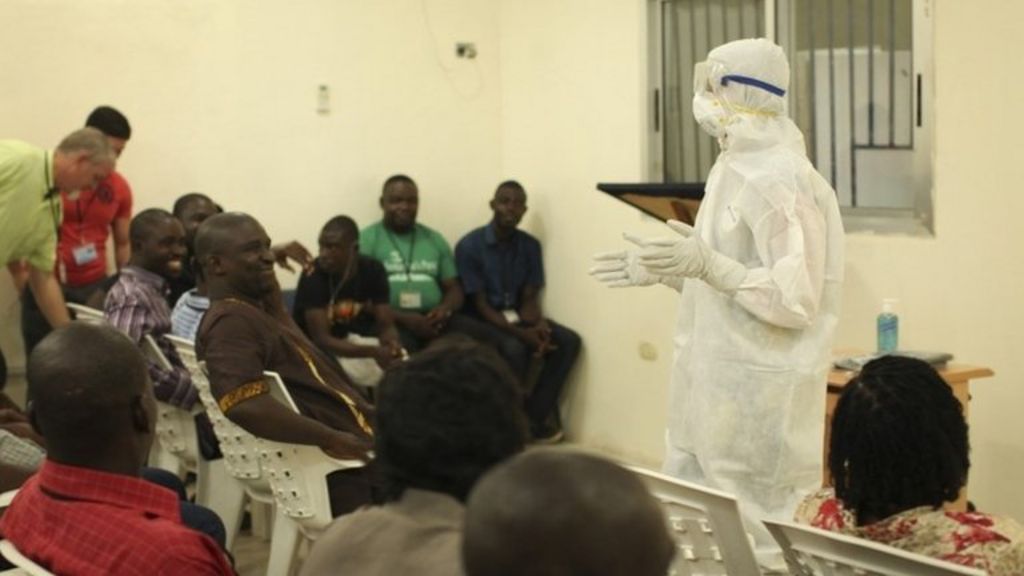
The head of the World Health Organization and leaders of West African nations affected by the Ebola outbreak are to announce a new $100m (£59m; 75m euro) response plan.
They are meeting in Guinea to launch the initiative to tackle a virus which has claimed 729 lives.
Sierra Leone has declared an emergency after 233 people died there.
Ebola spreads by contact with infected blood, bodily fluids, organs – or contaminated environments.
Initial flu-like symptoms can lead to external haemorrhaging from areas like eyes and gums, and internal bleeding which can lead to organ failure.
Ebola kills up to 90% of those infected, with patients having a better chance of survival if they receive early treatment.
‘A new level’
WHO Director General Margaret Chan is meeting West African presidents in the Guinean capital Conakry.
“The scale of the Ebola outbreak, and the persistent threat it poses, requires WHO and Guinea, Liberia and Sierra Leone to take the response to a new level, and this will require increased resources, in-country medical expertise, regional preparedness and coordination,” she said in a statement released on the WHO website on Thursday.
“The countries have identified what they need, and WHO is reaching out to the international community to drive the response plan forward.”
Key elements of the WHO’s new plan are:
- Stopping transmission in the affected countries through “scaling up effective, evidence-based outbreak control measures”
- Preventing the spread of Ebola to “the neighbouring at-risk countries through strengthening epidemic preparedness and response measures”
The response builds upon a previous plan that called for several hundred more personnel to be deployed to the region.
The WHO says that the scale of the ongoing outbreak is “unprecedented”, with about 1,323 confirmed and suspected cases reported in Guinea, Liberia and Sierra Leone since March 2014.
The plan is also expected to highlight the dangers faced by health workers on the front lines of the outbreak, and to call for improving ways to protect them from infection.
‘US victim flown to Atlanta’
Recently an unnamed US aid worker became infected with the Ebola virus, and was flown for treatment at a high-security ward at Emory University Hospital.
A spokeswoman for the US Centers for Disease Control and Prevention (CDC) said she was not aware of any Ebola patient ever being treated in the US before.
But in a statement the Atlanta hospital said it had an isolation unit which is specially equipped to deal with this kind of infection.
Meanwhile an American doctor with Ebola in Liberia has taken a “slight turn for the worse”, the Samaritan’s Purse aid agency said on Thursday.
Kent Brantly and another American worker, Nancy Writebol, “are in a stable but grave condition”, the agency said in a statement.
The statement said that Dr Brantly had been offered experimental serum – using blood from a child whose life he saved – but he had insisted that Ms Writebol should receive it instead.
Health workers, doctors and nurses are a scarce resource in all three countries, and hundreds of international aid workers and more than a hundred WHO staff have already been deployed to support regional response efforts.
WHO says that improving prevention, detecting and reporting suspected cases, referring people infected with the disease for medical care, as well as psychosocial support, are of paramount importance in battling the illness.
Ebola since 1976
The US is sending 50 extra specialists to affected areas.
In other developments:
- President Ellen Johnson-Sirleaf of Liberia – one of the worst hit countries – told the BBC the Ebola outbreak was catastrophic, and more help was needed to contain its spread
- Seychelles have cancelled Saturday’s 2015 Africa Cup of Nations qualifier against Sierra Leone because of fears over the Ebola virus
- Nigeria has ordered the temperature screening of passengers arriving from places at risk from Ebola while simultaneously suspending pan-African airline Asky for bringing the first Ebola case to Lagos
In London, the ActionAid charity said that the battle against Ebola was being hampered because of the spiralling price of hand sanitizers.
A spokesman said that the cost of some hygiene products had gone up sevenfold, making them too expensive for many people in the region.
Sierra Leone’s President Ernest Bai Koroma announced earlier that the epicentres of the outbreak in the east would be quarantined and he asked the security forces to enforce the measures.
Ebola virus disease (EVD)
- Symptoms include high fever, bleeding and central nervous system damage
- Fatality rate can reach 90%
- Incubation period is two to 21 days
- There is no vaccine or cure
- Supportive care such as rehydrating patients who have diarrhoea and vomiting can help recovery
- Fruit bats are considered to be virus’ natural host
Are you in West Africa? Do you have family or friends there who are affected by the outbreak? You can send your experiences to haveyoursay@bbc.co.uk using the subject line ‘Ebola Outbreak’.